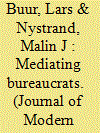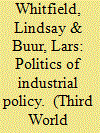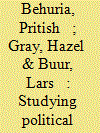| Srl | Item |
| 1 |
ID:
176487


|
|
|
|
|
| Summary/Abstract |
This article develops the concept of ‘mediating bureaucrats’ by exploring their role during liberal reforms that led to rehabilitation of the sugar industry in Mozambique. By focusing on how relations between the state, government and business are mediated by a group of cadres who have occupied positions in different social domains, the article argues that these ‘mediating bureaucrats’ cannot easily be identified in one-dimensional terms as belonging to either the public or private sector, the state or the market. It is argued that as ‘socially embedded actors’, the group of ‘mediating bureaucrats’ are in a position to translate and mediate between diverse and sometimes conflicting interests and aspirations of the state, the government and business. We use the rehabilitation of the sugar industry in Mozambique to show how mediating bureaucrats adopted two practices – muddling through and translation – in order to straddle conflicting interests during different reform initiatives in post-independence Mozambique.
|
|
|
|
|
|
|
|
|
|
|
|
|
|
|
|
| 2 |
ID:
128466


|
|
|
|
|
| Publication |
2014.
|
| Summary/Abstract |
Economic transformation is driven by successfully implemented industrial policy, but industrial policy is inherently political. We cannot understand why some governments pursue and implement industrial policy better than others without understanding its politics. This article addresses the conditions under which industrial policies are successfully implemented. It presents an analytical approach to understanding why some ruling elite-capitalist alliances lead to better economic outcomes than others. Sub-Saharan African countries present a particular puzzle, given their low productive capabilities and the relatively small number of successful productive sectors. The article examines the most successful productive sectors in Mozambique and in Ghana in order to illuminate the conditions under which such alliances occur and their specific characteristics and outcomes.
|
|
|
|
|
|
|
|
|
|
|
|
|
|
|
|
| 3 |
ID:
160891


|
|
|
|
|
| Summary/Abstract |
This article explores how the present socio-economic crisis in Mozambique is linked to the prospects of natural resource windfalls for the country. Drawing on the political settlement approach, it explores how the distribution of power both within and outside the ruling elite is structured and consequently how the underlying political processes have been shaped by the expectations of natural resource windfalls. The article argues that the present socio-economic crisis in Mozambique is not due to national resource assets in themselves. Instead, the political and economic downturn in Mozambique should be understood as a manifestation of how the political settlement has been organized and rent mobilization controlled by the ruling elite. To understand how the prospect of rents from natural resource sectors have influenced the political settlement, we have argued that one has to look at the dynamics of power both within and outside the ruling elite and the incentives they create for elites to use the control of power and access to economic benefits to achieve narrow and short-term gains rather than inclusive and longer-term goals.
|
|
|
|
|
|
|
|
|
|
|
|
|
|
|
|
| 4 |
ID:
154515


|
|
|
|
|
| Summary/Abstract |
The political settlements approach emerged out of a critique of new institutional economics developed by Mushtaq Khan in the 1990s. Since then, the political settlements approach has proliferated in donor programming and academic scholarship on African countries. This has led to some confusion about its core conceptual and methodological features. This Research Note starts by setting out our understanding of political settlements and provides an overview of existing political settlements literature on African countries. The note then explores how the key concept of ‘holding power’ has been employed in varied ways in the political settlements literature, which in turn has led to various methodologies to study power. The note discusses a number of these methodologies, including studying political ruptures as a window into analyzing the distribution of power in African countries, and emphasizes the importance of studying economic structure, ideology, violence rights, and rents as sources of holding power. The overall contribution of the note is to illustrate the varied strategies used in studying political settlements and to place them in conversation with one another.
|
|
|
|
|
|
|
|
|
|
|
|
|
|
|
|